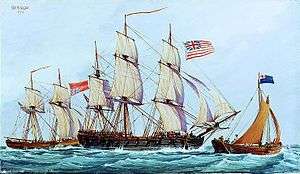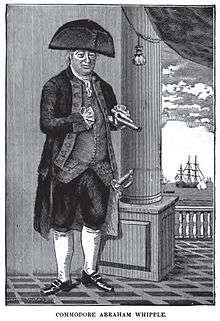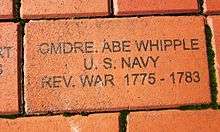Abraham Whipple
| Abraham Whipple | |
|---|---|
 Abraham Whipple, by Edward Savage | |
| Personal details | |
| Born |
September 26, 1733 Providence, Rhode Island |
| Died |
May 27, 1819 (aged 85) Marietta, Ohio |
| Resting place | Mound Cemetery, Marietta |
| Relations | Ebenezer Sproat (son-in-law) |
| Military service | |
| Allegiance |
|
| Service/branch | Continental Navy |
| Years of service | 1775–1780 |
| Rank |
|
| Battles/wars | American Revolutionary War |
Abraham Whipple (September 26, 1733 – May 27, 1819) was an American Revolutionary War commander in the Continental Navy, and later one of the founders of Marietta, Ohio. Born near Providence, Rhode Island, Whipple chose to be a seafarer early in his life and embarked on a career in the lucrative West Indies trade, working for Moses and John Brown. In the French and Indian War period, he became a privateersman and commanded privateer Game Cock from 1759 to 1760. In one six-month cruise, he captured 23 French ships.
In 1772, Whipple sank the first British ship of the American Revolution, the British schooner Gaspee, in the Gaspee Affair.[1] The first to unfurl the Star Spangled Banner in London, Whipple was also the first to sail an ocean-going ship 2000 miles downriver from Ohio to the Caribbean, which opened trade with the Northwest Territory.[2]
Early life
Abraham Whipple was born on September 26, 1733 to Noah Whipple, Jr. Abraham Whipple and Sarah Hopkins were married on August 2, 1761. They had three children: John, Catherine, and Mary. Catherine later married Colonel Ebenezer Sproat of the Continental Army.
Revolutionary activities
Rhode Island
As American colonists began to resist what they considered unfair oppression by the British crown, acts of defiance became increasingly prevalent. An early incident occurred on June 9, 1772 when Whipple led 50 Rhode Islanders in the capture and burning of British revenue cutter Gaspee. The ship had run aground off Pawtuxet while chasing the packet Hannah. The burning initiated an exchange of notes between Whipple and Captain James Wallace of HMS Rose. Wallace wrote, "You Abraham Whipple on June 10, 1772 burned his majesty's vessel the Gaspee and I will hang you at the yard arm!" Whipple responded, "Sir, always catch a man before you hang him."
Three years later, the Rhode Island General Assembly appointed Whipple commodore of two ships fitted for the defense of the colony's trade. On June 15, 1775, (the day the sea captain received his commission), Whipple led his men to capture the tender to frigate HMS Rose. After cruising in the vicinity of Narragansett Bay, he headed south to Bermuda to procure gunpowder for use by the colony. On the return voyage, Whipple transported naval recruits to Philadelphia. Upon her arrival there, his ship, Katy, was taken over by agents of the Continental Congress and was fitted out as sloop-of-war Providence.
Naval command

Whipple was commissioned a captain in the Continental Navy on December 22 and was given command of 24-gun ship Columbus. From February 17 to April 8, 1776, he commanded the ship during the first Continental Navy-Marine Corps amphibious expedition—the cruise to New Providence, in the Bahamas, to seize essential military supplies from the British garrison at Nassau.
After returning north to New England, Whipple captured five British prizes before March 27, 1778, when his ship ran aground off Point Judith, Rhode Island. After stripping the ship, the captain and his crew abandoned her and escaped capture ashore.

Assigned next to command 28-gun frigate Providence, Whipple ran the British blockade on the night of April 30, 1778, damaging HMS Lark and outrunning another Britisher during the escape. Tacking for France, the Providence crossed the Atlantic Ocean unmolested, bearing important dispatches relating to agreements between France and the American colonies, and reached Paimboeuf. After acquiring guns and supplies for the Continental Army, the Providence and the Boston sailed home to the colonies, taking three prizes en route.
Upon his return, Whipple received command of a small squadron—Providence, Ranger, and Queen of France. On one occasion in mid-July 1779, this group of ships encountered a large British convoy in dense fog off the Newfoundland Banks. Whipple concealed his guns and ran up the British flag. Thus disguised, Whipple cut 11 prizes out of the convoy, eight of which contained spoils of war valued together at over one million dollars (roughly 16.7 million in 2015 dollars),[3] making the venture easily one of the richest captures of the entire war.
Whipple then cruised off Bermuda before arriving at Charleston, South Carolina. On December 23, 1779. British forces threatened Charleston, which was at the time a key Continental port. The threat led Whipple to move the guns and crews from the Continental Navy ships in port on shore to reinforce the land batteries and repulse the expected British assault.
However, after a rugged four-month siege, the overwhelming pressure of British arms forced the Continental forces to surrender on May 12, 1780. Whipple remained a prisoner of the British until he was paroled to Chester, Pennsylvania, at which point he took no further part in the war. Upon the conclusion of hostilities, Whipple took up farming near Cranston, Rhode Island.
Later life


_at_Hong_Kong_in_1974.jpg)
For the rest of his life, he remained a farmer, with the exception of two spells of seafaring as master of merchantmen, first of the General Washington and then of the St. Clair. With the formation of the Ohio Company of Associates in 1788 and the initial westward migration into that territory, Whipple and his family became pioneers on the American frontier and were among the founders of the town of Marietta, Ohio, and the first named proprietor of Charleston, Vermont.[4]
Granted a pension by Congress in recognition of his distinguished service in helping to win American independence, Whipple died at Marietta, Ohio on May 27, 1819, and was buried at Mound Cemetery in Marietta. His gravestone reads:
Sacred to the memory of Commodore Abraham Whipple whose naval skill and courage will ever remain the pride and boast of his country. In the revolution he was the first on the seas to hurl defiance at proud Britain, gallantly leading the way to wrest from the mistress of the ocean her scepter, and there to wave the star spangled banner. He also conducted to the sea the first square rigged vessel built on the Ohio, opening to commerce resources beyond calculation. Born September 26th, A.D. 1733. Died May 27th, 1819. Aged 85 years.
Several ships of the United States Navy have been named USS Whipple in his honor. There is a Whipple Street, Avenue or Court in almost every one of the 39 municipalities in the State of Rhode Island and Providence Plantations.
Fictional references
- In The Case of Charles Dexter Ward by H.P. Lovecraft, Capt. Abraham Whipple, one of the "eminent townsmen" of Providence, Rhode Island, led the raid on Joseph Curwen's farm. He is also mentioned in "The Shunned House" as a cousin of the narrator's great-grandfather.
References
- ↑ "History of the Rhode Island Army National Guard". Archived from the original on April 6, 2009. Retrieved 2009-03-09.
- ↑ Hildreth, Early Pioneer Settlers of Ohio, 159–60.
- ↑ http://www.in2013dollars.com/1780-dollars-in-2015?amount=1000000
- ↑ Esther Munroe Swift. Vermont Place-Names: Footprints of History, Publisher: S. Greene Press (1996) ISBN 0-8289-0291-7 ISBN 978-0-8289-0291-5
Bibliography
- Cohen, Sheldon S.: Commodore Abraham Whipple of the Continental Navy: Privateer, Patriot, Pioneer, University Press of Florida, Series: New Perspectives on Maritime History and Nautical Archaeology, Gainesville, Florida (2010).
- Hildreth, S. P.: Biographical and Historical Memoirs of the Early Pioneer Settlers of Ohio, H. W. Derby and Co., Cincinnati, Ohio (1852).
External links
- This article incorporates text from the public domain Dictionary of American Naval Fighting Ships.